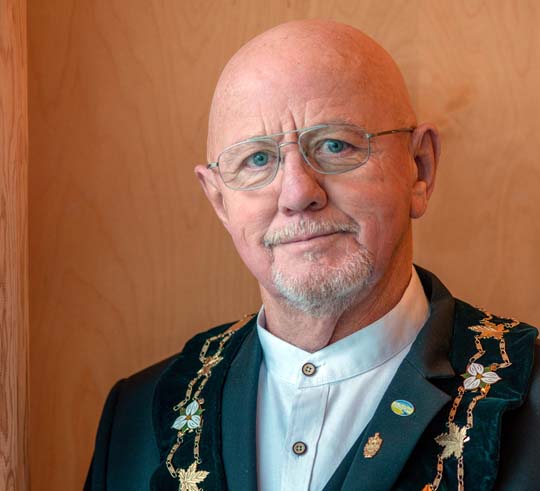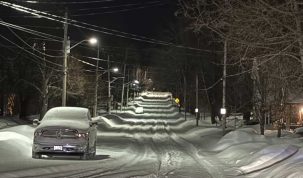TODAY’S NORTHUMBERLAND Cecilia Nasmith
The second annual Rear View DocFest April 21 and 22 has a line-up of films that will have you asking some provocative questions.
Start looking forward to Rear View
By Cecilia Nasmith
Nineteen documentary films dating from 1935 to 2015 (with running times ranging from five to 110 minutes) make up the second annual Rear View DocFest that will take place April 21 and 22, and committee chair Ross Pigeau reminds everyone that tickets are still available.
Brought to you by the Dressler Foundation, the films will run at The Loft (upstairs at 201 Division St., Cobourg).
Over two days, the films are broken into eight two-hour blocks built around two themes (Art As Social Change, Age and Happiness, and sometimes both in a single sitting), with four blocks per day. Admission is free for the first block of films on both days, and $10 per block otherwise.
Saturday kicks off with four films between 10 a.m. and noon:
Making Movie History: Dorothy Todd Henout
(2014, five minutes) has Henout describing her arrival at the National Film Board and her work on the ground-breaking community film-making campaign called Challenge For Change.
Has Anybody Here Seen Canada? A History of Canadian Movies, 1939-1953 (1979, 85 minutes) emphasizes the importance of documentaries as propaganda, with a special segment on Leni Riefenstahl’s Triumph of the Will and how the documentary on the rise of Hitler was used to galvanize social change and support for the war effort among Canadian audiences.
Maud Lewis: A World Without Shadows
(1976, 10 minutes) refers to the world of beauty as observed by the artist, a woman crippled by arthritis in her youth who discovered art and painting at the age of 30.
Mabel
(2015, 20 minutes) is 90-year-old Mabel Robinson, who broke barriers in the 1940s by becoming the first woman in Hubbards, NS, to open her own business. More than 70 years later, Robinson still works at that beauty salon, providing shampoos and sets to succeeding generations of customers.
The next group of April 21 films runs from 1 to 3 p.m. and examines the struggles that can be involved in art:
Debris
(2015, 14 minutes) is a portrait of Tofino, BC, intertidal artist Pete Clarkson as he works on his most ambitious and personal project: a memorial to the great and devastating 2011 earthquake and tsunami that hit Japan.
Ai Weiwei: Never Sorry
(2012, 91 minutes) chronicles the artist and activist as he prepares for a series of exhibitions, during the course of which he clashes repeatedly with the Chinese government.
Following that, two very emotional films occupy the 4-to-6-p.m. slot:
Happy
(2011, 76 minutes) explores the secrets behind this most-valued emotion through real-life stories of people around the world and interviews with scientists who are researching the issue.
Shameless: The Art of Disability
(2006, 48 minutes) tracks a motley gang of five disabled artists as they create and present their own self-representations, during which they show not only their passion for art and transformation but also the everyday complexities and unexpected richness of life with a disability.
April 21 ends with two films that shaped the nation around the time of the Second World War, running from 7 to 9 p.m.:
Churchill’s Island
(1941, 21 minutes) won the National Film Board its first Oscar. Narrated by a young Lorne Green, it was a shameless play to raise morale among Canadians during the Second World War.
Triumph of the Will
(1935, 110 minutes) was filmed as unabashed propaganda during the rise of Hitler’s Third Reich by gifted pioneering cinematographer Leni Riefenstahl – who won Hitler’s favour and thus gained wide access to her subject. Canada’s National Film Board used scenes from this film in in 1942 to galvanize social change in Canada in support of the war effort.
On Sunday, two films open the day between 10 a.m. and noon:
Age Is No Barrier
(1989, 24 minutes) is the story of a group of seniors who call themselves the U of Agers. They meet regularly to do gymnastics, seeing themselves as ordinary people who do extraordinary things (and hope to inspire others to do the things that make them happy).
Capturing Reality: The Art of Documentary
(2008, 97 minutes) interviews 33 leading documentarians (from cinema-verite pioneers like Albert Maysles and Michel Brault to mavericks like Errol Morris and Nick Broomfield) on their challenges in capturing reality on film to shape into art that influences the world).
Two films between 1 and 3 p.m. tell the stories of extraordinary young people:
Hannah’s Story
(2007, 29 minutes) is about Hannah Taylor. Spotting a homeless person in a Winnipeg back alley, she took that disturbing experience and let it inspire her to find happiness by doing her part to change the world.
Maidentrip
(2013, 82 minutes) is the two-year voyage of 14-year-old Laura Dekker, who set out to become the youngest person ever to sail around the world – alone.
Three films look at social change between 4 and 6 p.m.:
VTR St. Jacques
(1969, 26 minutes) is about a citizen’s committee in a poor Montreal neighbourhood that filmed people’s concerns and shared them with the larger community. It spurred a conversation about shared concerns and joint solutions with positive results.
Spare Change
(2008, seven minutes) is an animated short recounting interesting and sometimes comical experiences that Ryan Larkin experiences over many years as a panhandler (sadly, he died before the film was completed).
Manufactured Landscapes
(2006, 86 minutes) extends the narratives of photography for a meditation on planetary human impact.
The docfest ends with two films that celebrate the love of music from 7 to 9 p.m.:
Making Overtures: The Making of a Community Orchestra
(1984, 28 minutes) is the Oscar-nominated story of a Cobourg orchestra and choir led by Philip Schaus, an affectionate and humourous portrait that unveils the musicians’ passion for performance, imaginative fundraising methods and collective will to survive.
Buena Vista Social Club
(1999, 105 minutes) is the Wim Wenders film about aging Cuban musicians whose gifts had been shoved into a corner when Castro took over the island nation. When Ry Cooder travelled to Havana, he sought to bring the group out of retirement and back to performing.
Pigeau said that a weekend pass for all blocks is being made available for $50, a $10 savings over purchasing passes for individual blocks.
Passes of all kinds can be purchased on-line, he said, as well as at the door.























